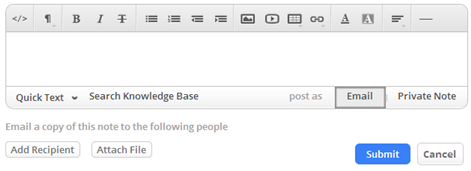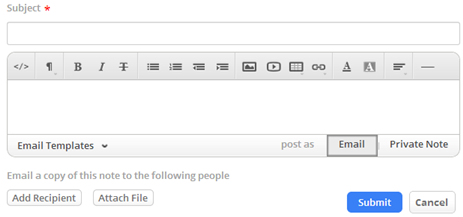Difference between revisions of "Private Notes and Email Messages"
From AgileApps Support Wiki
imported>Aeric |
imported>Aeric |
||
| Line 1: | Line 1: | ||
===About Private Notes and Email Messages=== | ===About Private Notes and Email Messages=== | ||
Private Notes and Email messages can be created when viewing a {{CaseRecord}}. They are stored in the record history, displayed underneath the record. The difference is: | Private Notes and Email messages can be created when viewing a {{CaseRecord}}. They are stored in the record history, displayed underneath the record. The difference is: | ||
:* | :* A Private Note doesn't cause an email to be sent to anyone. | ||
:* An ''external user'' | :* Any ''internal'' user who views the record can see all email messages and notes recorded in the history. | ||
::* For the [[Cases Object]], email responses are stored in the history, as well as sent messages. For other objects, only sent messages are recorded. | |||
:* An ''external user'' who is accessing the record using the [[Service Portal]] sees only those messages in the record history in which they were the sender or a recipient. | |||
==Working with Private Notes and Email Messages== | ==Working with Private Notes and Email Messages== | ||
Revision as of 23:27, 10 March 2014
About Private Notes and Email Messages
Private Notes and Email messages can be created when viewing a a Case record or some other record. They are stored in the record history, displayed underneath the record. The difference is:
- A Private Note doesn't cause an email to be sent to anyone.
- Any internal user who views the record can see all email messages and notes recorded in the history.
- For the Cases Object, email responses are stored in the history, as well as sent messages. For other objects, only sent messages are recorded.
- An external user who is accessing the record using the Service Portal sees only those messages in the record history in which they were the sender or a recipient.
Working with Private Notes and Email Messages
Creating a Private Note or Email Message
- Under the record information, click in the area that says Reply or Add a Note
The area expands, and several additional buttons appear. - Click [Private Note] to add an entry to the record history
- Or click [Email] and select message recipients.
The message is added to the record history, the same as a note. - For a Case record in ServiceDesk, the following form appears:

- Quick Text - Insert a segment of Quick Text into the message.
- Search Knowledge Base - If a Knowledge Base is present, use this option to insert a link to an article.
- For all other records, including case records in other Dynamic Case Management applications, this form appears:

- Email Template - Select an optional Email Template to use for the message.
- For all records, you can also:
- [Add Recipient] - Click this button to add additional message recipients for an email.
- [Attach File] - Click this button to add an Attachment.
- Click [Submit]